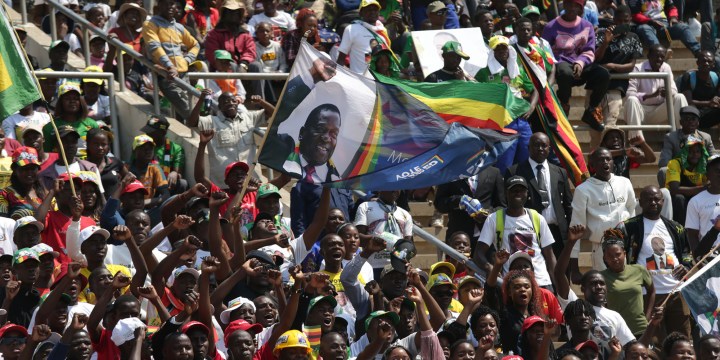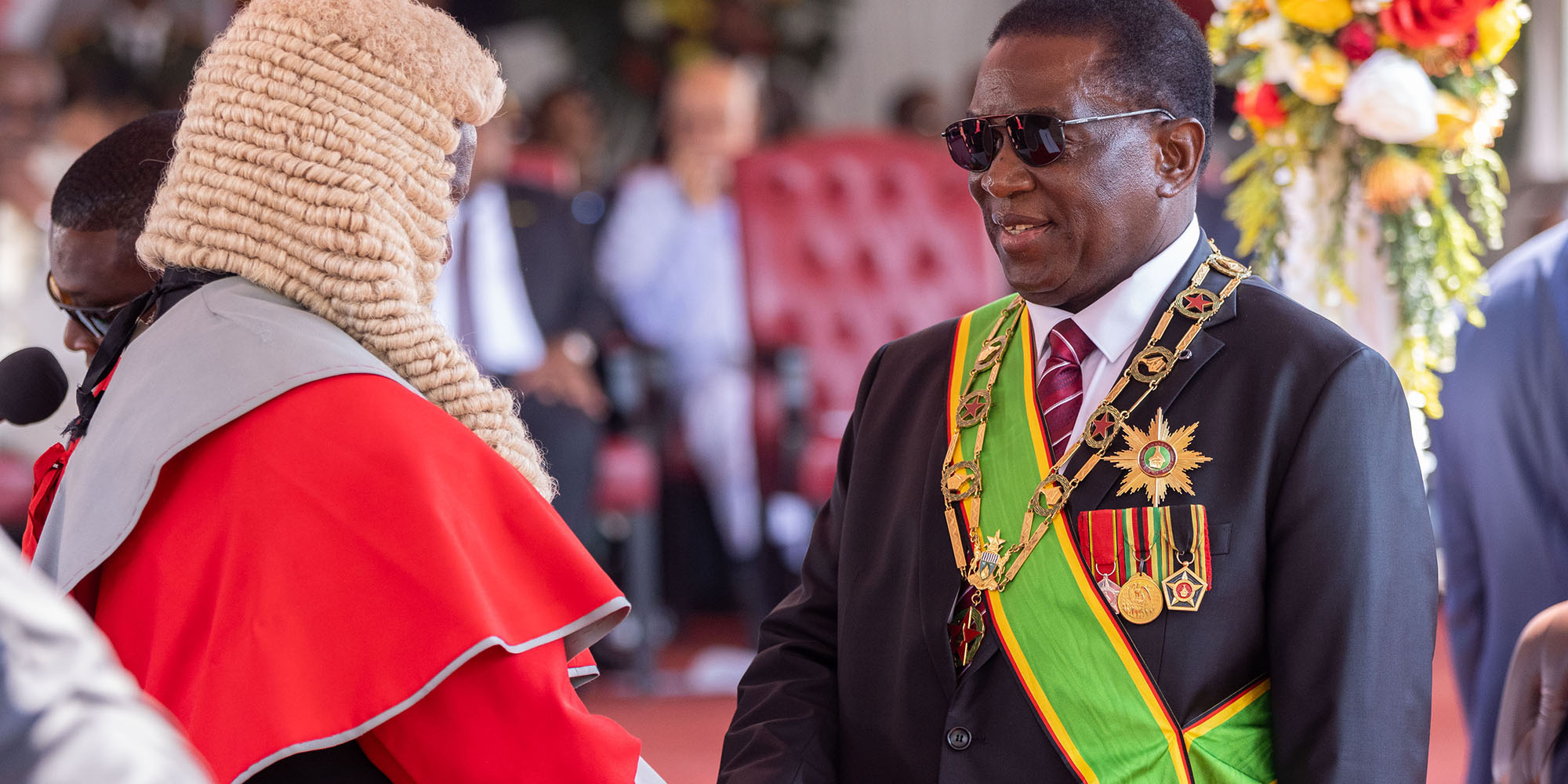REGIONAL FISSURES
SADC: After Zim’s chaotic elections, Zambia’s Hichilema leads where South Africa fails

Zimbabwe’s 2023 election has brought to the fore political fault lines in the SADC. Zambia led by Haikande Hichilema is ushering in a new democratic wave, while the liberation parties of ANC, Zanu-PF, Swapo, CCM and Frelimo are holding onto power with a vice grip.
“The more things change, the more they stay the same.”
Despondency and anger were palpable in the streets and homes of Zimbabwean citizens as the Zimbabwe Electoral Commission (ZEC) announced Emmerson Mnangagwa as the winner of the 2023 presidential elections. Zanu-PF has perfected the art of “electoralism”, which has relegated the national plebiscite in Zimbabwe to a staged play, prepared over five years and acted out between the Zambezi and Limpopo rivers.
However, the main opposition, the Citizen Coalition for Change (CCC) has gone off script and demanded fresh elections, conducted by the Southern Africa Development Community (SADC) and the African Union (AU) – and the international community by extension.
Key questions arise: does the SADC hold such powers and, more pertinently, what role will the key protagonist in SADC, South Africa, play?
Nevers Mumba, Zambia’s former vice president, stood in front of journalists who were half expecting him to toe the SADC electoral line, well trodden when it came to Zimbabwean elections: “Say less, bless the elections, thank the government for their hospitality.”
However, with a powerful voice, he tersely concluded his scathing report – much to the ire of the ruling Zanu-PF party preparing to walk the red electoral victory carpet – that “the Mission noted that some aspects of the Harmonised Elections fell short of the requirements of the Constitution of Zimbabwe, the Electoral Act, and the SADC Principles and Guidelines Governing Democratic Elections (2021)”.
The shortcomings he spoke of have been well reported and documented during this electoral cycle and have included voter intimidation, voter suppression and biased state media.
SADC and regional politics

Zimbabwe’s Chief Justice Luke Malaba (left) congratulates President Emmerson Mnangagwa on his reelection. Reaction to the August elections has highlighted fault lines within the SADC regional bloc. (Photo: Tafadzwa Ufumeli / Getty Images)
The SADC’s Mumba-led report lifted a veil from evolving regional politics in southern Africa. The current chair of the SADC Troika is Zambian President Haikande Hichilema, a position that gave him the power to appoint the head of the SADC Electoral Observer Mission to Zimbabwe.
The critical report should not come as a surprise to onlookers since Mnangagwa actively supported Edgar Lungu’s failed bid to stay in power in 2021 – when he eventually lost to Hichilema. Hichilema comes from the emerging crop of progressive democrats that includes him, Nelson Chamisa from Zimbabwe and Bobi Wine from Uganda. This can be defined as the democrat axis which aims to wrestle powers from Big Men and parties that have held onto power for 20-plus years.
These Big Men and parties in southern Africa are known colloquially as the liberation parties and formally as the Former Liberation Movements of Southern Africa (FLMSA). They include the ANC from South Africa, Swapo from Namibia, Frelimo from Mozambique, Chama Cha Mapinduzi from Tanzania and their Zimbabwean brethren, Zanu-PF.
These parties hold regular annual meetings, watering and nurturing relationships that are in some cases 50 years strong. Hence why the other two members of the current SADC Troika, Namibia and Tanzania, immediately came out to discredit Mumba’s report and pledge their support for Zanu-PF’s disputed victory.
There is a clear demarcation between the democrat axis and the liberation parties and Zimbabwe’s election has become the first battleground since Zambia’s 2021 election.
CCC’s strategic decision to throw Zimbabwe’s disputed election onto SADC’s lap was not in any way a mistake. Understanding that if the party took its grievances to the Constitutional Court as it did in 2018 it would most likely lose. Roping in the SADC has historical and moral weight to it, but it might lack legal and enough political credence to be successful.
Contrary to the dominant nationalist rhetoric, countries in southern Africa relied heavily on each other to achieve their independence in one way or the other.
Zambia was the exiles’ home. Zimbabwe’s 1980s foreign policy was dedicated to supporting the end of apartheid, and South Africa’s winding down of apartheid led to Namibia’s independence in 1990. This history should inform the current progressive movement that regional networks are not an afterthought but rather a requisite to achieving desired change in the respective states, especially Zimbabwe, which is economically and by extension politically reliant on South Africa.
Legally, the CCC’s decision requesting the SADC to effectively take over from the discredited Zimbabwe Electoral Commission (ZEC) and manage elections seems to be on shaky legal grounds. The SADC’s powers and responsibilities are outlined in the SADC treaty (1992), SADC Electoral guidelines, and the Organ on Politics, Defence and Security.
The statist nature of governance, lack of resources and inadequate conflict resolution mechanisms leave the SADC, as a body, being a weak agent for the CCC’s cause.
For example, the Protocol for the Organ on Politics, Defence and Security states that “the Organ may seek to resolve any ‘significant intra-state conflict’ which can include large-scale violence between the state and its population, a military coup, condition of civil war, a conflict threatening the peace and security within a region or in the territory of another state party”.
Zimbabwe’s current conditions do not seem to satisfy the stated requirements for intervention within a country. A military coup that did occur in 2017 was silently ignored by the SADC. In response to conflicts that threatened peace and security, the SADC has usually taken the mediation route, as it did with Thabo Mbeki in Zimbabwe in 2007 and Madagascar in 2009.
To further weaken the CCC’s strategy in seeking SADC intervention, the SADC limits itself to observing elections and has never supervised or, more to the point, conducted elections in any of its states. Such action would require member states to agree, which is very unlikely due to the SADC being dominated by the liberation party axis.
The extinction of the SADC Tribunal or a regional parliament with actual legislative powers further weakens the SADC strategy. Article 33 of the SADC Treaty empowers member states to sanction another member state but that too is very unlikely.
South Africa’s role
Any successful action at SADC level for the CCC would likely require a significant change in South Africa’s policy to Zimbabwe. As the behemoth in the community, South Africa’s policy stance on several matters becomes the regional norm.
Currently, the ANC has refused to change tack on the Zimbabwe question. However, if the ANC could be pressured to change its stance, the SADC’s Protocol on Politics, Defence and Security Cooperation provides South Africa a legal route to use. Article 11 (2)(b)(iv) notes that “the Organ can resolve a significant intra-state conflict which threatens peace and security in the region or in the Territory of another State Party”.
South Africa’s immigration crisis, fuelled by Zimbabwean migrants and recurring xenophobia, could be grounds upon which South Africa demands SADC-led action and mediation leading to re-elections the CCC requires.
Zimbabwe’s 2023 election has brought to the fore the political fault lines in the SADC. Zambia led by Hichilema is ushering in a new democratic wave while the liberation parties of ANC, Zanu-PF, Swapo, CCM and Frelimo are holding onto power with a vice grip. By attending Emmerson Mnangagwa’s inauguration, Cyril Ramaphosa seems to have dug his heels into the liberation sand.
The CCC’s SADC strategy, although novel, seems to be lacking concrete political support from the region, especially from South Africa which, as the de facto leader of the region, will make or break the course Zimbabwe’s opposition party has taken.
If successful, it will set a precedent in the region, indeed the world. If not, millions of Zimbabweans will continue to complain through gritted teeth that “the more things change, the more they stay the same”. DM
Kudakwashe Manjonjo is a democracy activist who has worked in civil society and community development. He is a Canon Collins and Southern Centre for Inequality Studies (SCIS) PhD Scholar in Sociology at the University of the Witwatersrand. He writes this article in his personal capacity.



















I enjoyed reading this focussed, thoughtful & well-written article.
What an educational opinion piece
Great that the shoots of the democratic forces are starting to sprout and long may it continue. This continent needs to banish these cruel, predatory and rapacious dictators who believe they are in power for life and then pass it onto their families as if God granted them such dynasty. Africa will never move forward and realize its potential with such backward, corrupt and useless leaders. Unfortunately, they can’t count on SA as they will be severely disappointed and betrayed. SA under the treasonous and despicable anc and now under the Cyril the spinless and duplicitous, have betrayed human rights, freedom and democracy from day 1. They are accused no 1 when it comes to Zimbabwe! Rubber stamping stolen and fraudulent elections and then being one of the first to congratulate the thieving incumbent is an anc hypocritical specialty – to our eternal shame – as is supporting the worst human rights abusers and murderers like the mass-murdering Putin monster.
You started well, but leave Putin out of this because is fighting a different fight.
I disagree, the ANC’s support for Putin and other dictators, as well as contrived “democracies” that have outlived their contributions to freedom is closely and directly related to their support for ZANU PF.
Put in is a monster. The ANC backs him to the hilt. The ANC, in almost every public statement, backs the worst human rights abusers of the 21st century: Gaddafi, ZANU-PF, Putin, Al-Bashir, Xi, Venezuela’s cabals – and then silence on others: Sudan conflict, CAR, Sahel (all with the hand of the Wagner terrorists in their brutal conflicts), women rights LGBT rights across African and the Middle East – celebrating thr entry into BRICS of brutal regimes like Iran and Ethiopia, as well as the criminal capital of the world, Dubai. Sorry, but you can’t ask anyone to highlight the ANC’s despicable attitude towards Zimbabwe and not also their shameful general human rights attitude on the global stage.
Putin is so despicable even autocorrect changes his name!